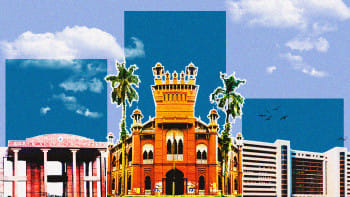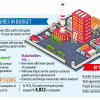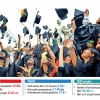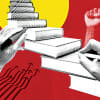Education budget: A futile debate achieving little

For the past 15 years since the Awami League government took over, there has been pre-budget discussion every year about the need for increasing the miserably low public expenditure for education and health. And then the proposed annual budget paid little heed to the plea for a change in priorities, causing frustration and disappointment. The proposed FY2024-25 budget has been no different—it follows the same pattern.
The new budget can be described as a "crisis response" one that the government has prepared in the face of the formidable challenges of unabated inflation, economic slowdown, revenue shortfall, dwindling foreign exchange reserves, and a rising annual debt burden. Allocations have been tightened for every sector, while there is a nominal increase in the total budget from the previous one and a high level of deficit financing. There is, therefore, no expectation of any significant increase in education and health allocations as borne out by the proposed budget. Nor is there an indication of any shift in strategy and priority responding to long-standing issues in education and human development, which have been periodically raised by educationists and concerned citizens.
Out of a Tk 7,97,000 crore budget, education allocation is Tk 94,710 crore or 11.88 percent of the budget and 1.69 percent of GDP. Allocations proposed for sub-sectors of education are: Tk 44,108 crore for secondary and higher education; Tk 38,819 crore for primary and mass education; and Tk 11,783 crore for technical and madrasa education. The education allocation for the outgoing fiscal year was Tk 88,162 crore or 11.5 percent of the budget and 1.76 percent of GDP. The revised budget was, however, reduced to Tk 74,597 crore. The proposed education budget is only nominally higher than the allocated amount for the past year, which is actually a reduction if the inflation of over nine percent is counted.
Noteworthy is the fact that the education sector is not able to use all of the funds allocated for it in the outgoing financial year. As much as Tk 14,000 crore will not be spent, as the revised allocation indicates. It is difficult to make a case for increased budget when the fund available cannot be fully utilised.
As this author as well as other education activists have often pointed out, the education authorities—the two ministries—have to make a case for public investment priorities in education and be persuasive about it. When the national budget fails to give due recognition to the needs and priorities of a vital sector such as education, it is as much the failure of the education ministries as it is of the finance ministry, which presents the budget on behalf of the government.
It is not, but should have been, in the public domain what the two ministries asked for in respect of increasing allocations and whether any innovative thinking found a place in their budget submission. There was no opportunity for public discussion when the budget proposals by the two education ministries were being formulated. There hasn't been a great receptivity on the part of the two education ministries, the political leadership and the administrative decision-makers regarding the civil society education advocates' pleas for re-thinking the needs for 21st century education. There is rhetoric aplenty about Smart Bangladesh and a smart new generation, but the serious and holistic planning and systematic efforts for achieving results have been lacking.
Educationists have argued that the various initiatives taken by the two ministries have been fragmented, partial and treating the symptoms of diseases rather than the roots of problems. These initiatives have not been based on a holistic and coordinated sector-wide effort to achieve well-articulated medium- and long-term educational objectives. Cases in point are the introduction of the new curriculum and student assessment without preparing the ground; the sub-sector activities such as the series of primary education development programmes (PEDP5 or the fifth round is supposed to be under consideration now); the decision again to shift Classes 6 to 8 from secondary to primary schools (after several failed attempts since 2010 Education Policy was announced); various largely ineffective and frequently re-formulated teachers' training projects; and token efforts towards building a decentralised, responsive and accountable system of school education.
Academics and researchers have put forward an agenda for re-imagining education for the 21st century through their advocacy, such as Education Watch reports. This agenda includes moving towards a greater and genuine decentralisation of education governance; attracting talented people to the teaching profession and keeping them there; a major initiative to widely and effectively apply the blended approach (merging tech-based and teacher-supported learning); building partnerships between government and non-state actors; and establishing a permanent education commission to guide and monitor education system changes. These could be the components of an education sector plan and a 10-year megaproject for education. All of these would lay the ground for equitable, quality and inclusive school education for all children, thus building the foundation for an education system fit for a higher-middle-income and eventually a developed country. Such a sector plan would demand larger resources and efficient use of the resources.
The annual budget is not the instrument for a major overhaul of the education system. It can, however, reflect and help prepare the ground for a transformative change, if such a change is envisaged by the policymakers. The new budget, as the ones of past years, following a much trodden path, has not helped a move in this direction.
Dr Manzoor Ahmed is professor emeritus at BRAC University, chair of Bangladesh ECD Network, adviser to Campaign for Popular Education (CAMPE), and associate editor of the International Journal of Educational Development.
Views expressed in this article are the author's own.
Follow The Daily Star Opinion on Facebook for the latest opinions, commentaries and analyses by experts and professionals. To contribute your article or letter to The Daily Star Opinion, see our guidelines for submission.

 For all latest news, follow The Daily Star's Google News channel.
For all latest news, follow The Daily Star's Google News channel. 










Comments